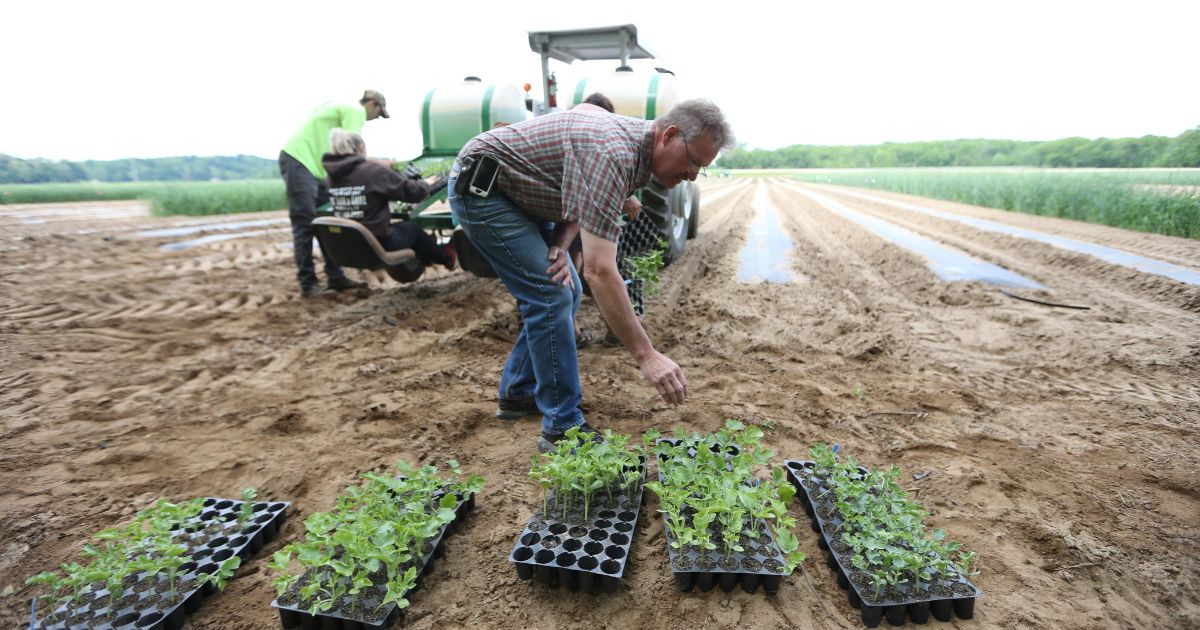About the feature
Many people are involved in the remarkable range of programs, services and facilities that undergird research in the College of Agriculture. Collectively they’re integral to the college fulfilling its research mission. “Behind the Research” explores their individual roles. Each academic year, we profile six people whose work supports the College of Agriculture’s global reputation for developing innovative, multidisciplinary solutions to challenges and then putting those solutions into action.
DENNIS NOWASKIE, SUPERINTENDENT, SOUTHWEST PURDUE AGRICULTURE CENTER (SWPAC)
- Manages SWPAC- the vegetable PAC-"as if it were my own farm."
- Started a maintenance plan for SWPAC when he joined Purdue in 1994 that continues to keep equipment in good operating condition, including some dating to the 1950s.
- Contributed his experience in melons to major research project investigating the effects of neonicotinoids (insecticides) on pollinators across different crops.
 Dennis Nowaskie, Superintendent, Southwest Purdue Agriculture Center (SWPAC)
Dennis Nowaskie, Superintendent, Southwest Purdue Agriculture Center (SWPAC) It’s raining at the Southwest Purdue Agriculture Center in Vincennes, and Dennis Nowaskie and his crew just set a one-acre plot of watermelons by hand. It’s too muddy for tractor traffic but the superintendent wanted to get the plants into the ground. “It took eight of us 2-1/2 hours, but they’re in the field and it’s raining again,” he says. “Sometimes you just have to scrap your original plan.”
That flexibility reflects Nowaskie’s general attitude toward overseeing one of the eight Purdue research farms across Indiana: “From planting to harvest, whatever it takes.”
Managing SWPAC’s daily operations means providing the assistance that researchers need: “Whether that involves helping with the design of a plot layout, giving an opinion from past experience, applying treatments, tending to the transplants in the greenhouses on weekends, conducting harvest, or picking up a shovel to dig a trench to help drain water off a research plot from an excessive rainfall,” he says.
“I want to give any researcher who comes here the best experience they can have to produce quality data,” he adds. “I try to ensure that the appearance of SWPAC is clean, the equipment and infrastructure are maintained, and most importantly, the quality of research being conducted here is the best that it can be.”
Nowaskie grew up on a family farm in Knox County — “the heart of melon country in Indiana,” he notes. Always mechanically inclined, he earned an associate degree in diesel mechanics at Vincennes University and worked in that industry for 10 years while he farmed on the side.
In 1994 he joined the staff of SWPAC, where he helped maintain the equipment and research plots. With the pending retirement of the previous superintendent, Nowaskie returned to Oakland City University to earn a bachelor’s degree and better position himself for the job. In 2008, he became superintendent and gave up farming: “Purdue University was the right path for me,” he says.
At 220 acres with research occurring on about 90 acres, SWPAC is the smallest of the Purdue Agricultural Centers but one of the most active with research conducted on vegetable crops. Nowaskie oversees the maintenance of the infrastructure at SWPAC including six greenhouses, three high tunnels and two diagnostic and research laboratories. SWPAC also houses an onsite plant pathologist and horticulturist, and is a hub for national weather and air-monitoring programs.
“It’s a team effort, and we have a great team,” he says of his two full-time staff members and administrative assistant. SWPAC also hires up to a dozen students each year to help with planting, maintaining, collecting data, cultivating and harvesting the research projects.
Purdue scientists are researching not only watermelon and cantaloupe at SWPAC, but a wide range of other fruits and vegetables in addition to row crops. “If you grow it in your garden, we’ve probably had it here,” Nowaskie says.
Despite advances in technology, many tasks for vegetable crops are still done by hand, he notes. His mechanical skills have come in handy. “Much of the equipment at SWPAC is older but that doesn’t mean it still can’t get the job done,” he says. “I have repainted 10-15 tractors, overhauled engines and split tractors in half to replace clutches, for SWPAC and for other PACs too,” he says.
The “excitement of what’s around the corner” has kept Nowaskie at Purdue for 28 years. “I’ve got two favorite smells in the world,” he says. “fresh-turned dirt, and rotten watermelons in the field — because then I know the season is over.”





